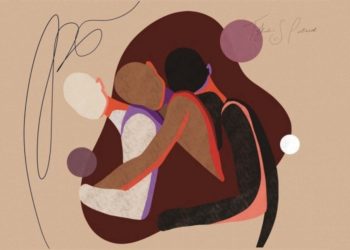‘You know, I wouldn’t be surprised if we got to heaven and discovered there was nothing wrong with being an evil person.’
My head whipped up, and I looked them dead in the eye. ‘Maybe, but the chances of that happening is slim…to none.’
Their smile is forlorn. ‘You’d be surprised.’ They sigh heavily and rub their hair. ‘I do everything I am meant to do. I don’t steal or cheat people even though business would be wayyyy better if I did that.’ They sigh. ‘I practice sexual purity and treat people decently, but nothing in my life is going according to plan.’ Their disappointment sits between us like a plate of cold food, and they push the morsels around with their eyes.
‘Look at X. Their life is the complete opposite of mine, but everything works out for them.’ I smile because I know X. X has one of those lives that was touched by the divine. Most things—and I use most because no one’s life is always perfect—fall into place for them.
They tick them off on their fingers. ‘They have a stable job, their partner is a knockout and is faithful to boot, and every investment they attempt flourishes even though they don’t live a good life.’
I nodded. ‘So what would you term a good life?’
They shrugged. ‘Being a good person. Always thinking of others before or as you think of yourself. Keeping the commandments. That sort of thing.’
I smiled. I knew this mindset. It was a sort of moral economics where good deeds accrued brownie points that could be traded in for answered prayers and the finer things in life. In this (imaginary) moral economy, the good are at the top of the food chain, while the bad can barely afford anything. I understood where my friend was coming from because I, too, had been there a long time ago.

In the court of childhood disagreement, justice was both my parents, consistently trying to balance the scales. Whenever my brothers and I had disagreements—and dare I say, fights—we tumbled into their room, voices rising over each other like steam, certain that Daddy and Mummy would dissolve the other person’s morally grey arguments and reestablish the boundaries of fairness.
As I got older, I retained this mindset. I felt this was how the world operated. I always believed that the scales will always balance no matter the situation, like a body achieving homeostasis. That justice will forever be a house special. That good will always be rewarded, evil punished, and misunderstandings ironed out.
Wrong!
Coming to terms with the inherent unfairness of life is what makes life bearable. Life is unfair—and that’s ok. It is not a personal attack on you. It’s just something we all have to deal with. Good is not always rewarded, and sometimes evil gets more congratulatory messages and pats on the back than punishment. The good ones die young, and the evil ones age gracefully. Sometimes people will wrong you and get away scot-free. Sometimes you’d be misunderstood.
C’est la vie.
It is not fair, but it is what it is. Life is not a Nollywood production where life punishes your ex-girlfriend for leaving you by making her new boyfriend fall on hard times the instant you become rich. If you don’t work hard and make financially prudent decisions, you’ll still remain where you are while the other person flourishes. Humans have an inbuilt sense of justice whose script life sometimes ignores. Your high school bully may end up running a tech startup while you work a 9-5. It’s not about you. It’s just life having fun at shuffling the cards.
There is a certain pride that comes with being religious or spiritual. And this pride leads to the devout believing they deserve the best things in life because they believe in, worship, and follow the injunctions of their religious deity. They see themselves as hallmark sacrosanct, a head above the rest, with one foot already in heaven. So when things don’t work out, like my friend, they face a crisis of fate. They question everything, from God’s love down to the existence of karma. “After everything I have done for you” becomes the recurrent theme of their prayers. This conversation I had with my friend reminds me of a quote I once saw on the high streets of WhatsApp:
“Comparison will have you thinking you are superior or inferior to someone else, and neither pleases God.”

It is easy to look at someone’s life and immediately summarize that they are ‘bad’ simply because they do not follow certain rules or engage in certain neuroses you associate with sanctity. Although a decent person, my friend had made various snap judgments about X’s life from their own moral vantage point. They didn’t know X was charitable, volunteered at a nursing home, and supported a poor family in his old neighborhood. My friend just saw the cigarette smoke, wild parties, and revolving door of sexual partners and summarized that this one was on the highway to hell. Yes, X had vices, but he was a good soul and one of the best people you’d ever meet.
Goodness is not only gauged by how much good you do, nor by how much you give to charity or how willing you are to help others. It is calibrated by your humility and how willing you are to continue in that state of goodness when there is no reward, publicity, or applause at the end of the road.
So I’ll leave you guys with this question: Will you continue being a good person even if there is no reward at the end of the day?
Like what you read? Check out Dualism: Chapters from the Book of Harsh Realities and Value-Added Worth and Commodifying the Invaluable







